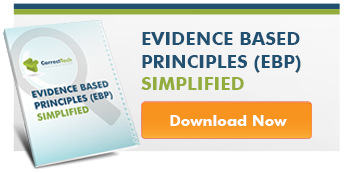Adapting CBT for Justice-Involved Clients - Check out the Blog Series!
Posted by Raymond Chip Tafrate, PhD, Damon Mitchell, PhD, & David J. Simourd, PhD on 3/13/20 6:00 AM
Topics: Assessment, Community Corrections Professional, Addiction, Relapse Prevention, client development, Developing a practice model, coaching community corrections clients, reentry, client needs and values, risk, EBP, Justice-Involved Clients, jic
What’s Behind the Box?
Posted by Raymond Chip Tafrate, PhD, Damon Mitchell, PhD, & David J. Simourd, PhD on 10/17/19 10:13 PM
Risk Assessment is Not the Same as Case Formulation
We would like to start with a story. Picture a courthouse in a struggling industrial town in Connecticut. The adult probation department is situated in the basement of this courthouse. We are beginning training with a new cohort of probation officers, teaching them how to incorporate forensic CBT techniques into their work. To start, one of the officers describes a current case and reviews the available assessment information. A quick review of the risk assessment reveals this is a high-risk case; a major area of concern is antisocial companions. We ask the officer to explain how friends and companions specifically influence criminal behavior for this justice-involved client (JIC). We get crickets! We ask, what role did friends play in the most recent offense? Again, an awkward silence permeates the room. While the officer certainly knows that antisocial companions is a risk factor for reoffending, she has not explored the nature of the JIC’s relationships and discussed with the JIC the specific role of companions in his offense history and daily routines. Unfortunately, this is a common training scenario when we begin.
Read MoreTopics: Assessment, Developing a practice model, coaching community corrections clients, client needs and values, risk, Justice-Involved Clients, jic
Understanding Risk: A Personal Experiment
Posted by Raymond Chip Tafrate, PhD, Damon Mitchell, PhD, & David J. Simourd, PhD on 10/4/19 1:55 PM
There is an interesting contradiction in the scientific research of justice-involved clients (JICs) as it relates to mental health. First, JICs tend to have a relatively high prevalence of mental health problems. Second, mental health symptoms among JICs are actually weakly related to criminality (i.e., poor predictors of recidivism). Although there are certainly individual cases in which a JIC’s mental health symptoms directly influenced their offending behavior, these are infrequent occurrences. For the majority of cases, criminal risk domains (discussed in our previous blogs) and not mental health symptoms drive criminal behavior. This concept is particularly important in terms of intervention.
Read MoreTopics: client development, client needs and values, high risk client, EBP
7 Underappreciated Hallmarks of Criminal Risk Models
Posted by Raymond Chip Tafrate, PhD, Damon Mitchell, PhD, & David J. Simourd, PhD on 9/26/19 10:00 AM
In our previous blog, we described the importance of risk reduction and the Central Eight risk domains. In this blog, we present some elements of risk models that often go unnoticed by practitioners. We believe these features of criminal risk, when applied thoughtfully, powerfully enhance supervision and case management practices. Here is how we think about risk in our work with justice-involved clients (JICs).
Read MoreTopics: Developing a practice model, client needs and values, risk, high risk client
We Need More Coaches and Less Referees
Posted by Lisa Sayler on 6/13/19 10:01 PM
What a powerful statement made by Dr. Ed Latessa while speaking about what works and doesn’t work in reducing recidivism at the OCCA conference in May of 2018. Of course, you need referees in a game and metaphorically when running a community corrections program. We must play by and enforce the rules, but coaches win games and make their players successful. Community corrections does need staff that “blow the whistle” when clients go out of bounds, give appropriate consequences and redirection, but that alone only keeps people in bounds during the game, it doesn’t teach them how to improve their skills and improve long term. In my experience, Dr. Latessa is dead on. Staff naturally gravitate towards being the rule enforcer rather than the encourager. Getting staff to take on coach as their primary role is something that can’t just be trained, it must be immersed in the daily culture of the program.
Read MoreTopics: Community Corrections, Positive Reinforcement, reaching clients emotions, client needs and values
Subscribe To Our Blog
Recent Posts
Posts by Topic
- Community Corrections (61)
- Evidence Based Practices (44)
- Community Corrections Professional (23)
- Software (15)
- Practices (12)
- Change (11)
- Technology (10)
- Risk Principle (8)
- reentry (8)
- probation staff (7)
- EBP (6)
- Outcomes (6)
- client development (6)
- client needs and values (6)
- coaching community corrections clients (6)
- Assessment (5)
- Community (5)
- Developing a practice model (5)
- Justice-Involved Clients (5)
- Remote work (5)
- The Coaching Habit (5)
- parole (5)
- risk (5)
- tele-supervision (5)
- tele-work (5)
- Community Engagement (4)
- Evan C. Crist (4)
- Community Corrections Client Services (3)
- Criminal Justice Reform (3)
- Implementation (3)
- Listening Skills (3)
- Motivational Interviewing (3)
- Policy (3)
- Positive Reinforcement (3)
- Practice Models (3)
- high risk client (3)
- reaching clients emotions (3)
- responsivity (3)
- Addiction (2)
- BOP (2)
- Conferences (2)
- ICCA (2)
- Management (2)
- Michael Bungay Stanier (2)
- Relapse Prevention (2)
- halfway house (2)
- jic (2)
- principles (2)
- procedures (2)
- program results (2)
- APPA (1)
- Appreciative Thinking (1)
- Brian Lovins (1)
- COVID-10 (1)
- Community Connection (1)
- Coronavirus (1)
- Crisis (1)
- Customer Service (1)
- Data Management (1)
- Fidelity (1)
- ICCA Seattle (1)
- Juvenile Corrections (1)
- Leadership (1)
- Monitor History (1)
- Opioid Addiction (1)
- Opioid Crisis (1)
- Orange is the New Black (1)
- Program Data (1)
- Reforms (1)
- Relapse (1)
- Second Chances (1)
- Switch by the Heath Brothers (1)
- Treatment (1)
- drug testing (1)
- going paperless (1)
- govcio outlook (1)
- impact sessions (1)
- innovation (1)
- intrinsic motivation (1)
- justice reinvestment (1)
- marijuana testing (1)
- money savings (1)
- opiod testing (1)
- paperless office (1)
- purpose (1)
- remote working (1)
- resources (1)
- sanction (1)
- staff productivity (1)
- technology solutions provider (1)
- the awe question (1)
- what works (1)
- what's on your heart (1)
- work from home (1)






